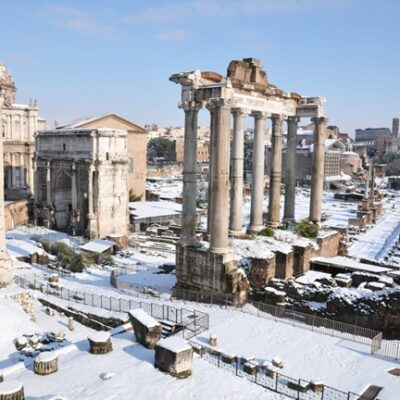Dr. Susanna de Beer
Director of Ancient Studies and Classical Reception, Vice-Director
Working at KNIR: 2022-2025
Email address: s.de.beer@knir.it
Telephone number: 0039 06 32696229
Discipline and Specialization: (Neo-)Latin Literature, Classical Reception Studies, Renaissance Humanism, Cultural History, The City and Symbol of Rome, Digital Humanities Universiteit: Leiden University
University: Leiden University
Website: https://www.universiteitleiden.nl/en/staffmembers/susanna-de-beer#tab-1

Follow me on
Profile
Trained in Classics at Leiden, and with a PhD in cultural history obtained at the University of Amsterdam, I am fascinated by the continued authority of Antiquity in later times, especially in the Renaissance. To understand how this authority is put to use in specific cases, I combine methods and perspectives from different disciplines, among which literary studies, classical reception studies and cultural history.
In The Poetics of Patronage (2013), I applied this methodology to understand how a Renaissance Latin author could shape his literary oeuvre and his patronage relationships by strategically employing the ancient discourse of literary patronage. It has been recognized as a pioneering monograph on Renaissance literary patronage.
In my NWO VENI project ‘Visions of Rome’ I have broadened my perspective, to understand how humanist Latin poets in different political and religious contexts claimed the ancient Roman legacy in the context of contemporary competitions, while by writing in Latin sought to revive this same Rome. I have explored this topic from various angles (classical reception, heritage studies, cultural history), and have collaborated with people from other disciplines studying the same processes (e.g. vernacular literature; art history; archaeology). The resulting monograph The Renaissance Battle for Rome. Competing Claims to an Idealized Past in Humanist Latin Poetry is forthcoming in the Classical Presences Series of Oxford University Press.
In recent years, with the generous support of an NWO Aspasia grant and several Leiden University grants I have developed a number of Digital Humanities initiatives, based on the conviction that they are instrumental in bringing scholars and resources from different disciplines together, and that our study of complex cultural processes could benefit from experimenting with new ways of visualization and publication. My main project is Mapping Visions of Rome, a web based research Portal to annotate, link and map literature on the City and Symbol of Rome. I am currently developing an interactive public ‘appendix’ to my monograph ‘The Renaissance Battle for Rome’, based on this environment. For more information on this project developed in Nodegoat see here. Another of my projects is De Vereeuwigde Stad, a mobile website (app) for (ancient) literature on locations in Rome, which includes information on ancient sites, characters and authors; suggestions for walks through Rome; early modern images of Roman locations. Now only available in Dutch, I am planning to make an English version in the near future.
Research
My research focuses on the processes of reception by which the authority and prestige of (Roman) Antiquity have been continuously claimed, with a special focus on the Renaissance. Here are summaries of some ongoing and past projects in this field. For my Digital Humanities Projects related to the City and Symbol of Rome, see my profile.
The Return of the Golden Age. The Reception of Golden Age Rhetoric from Antiquity up to the 21st century
Workshop at KNIR (23-25 June 2022) and ensuing edited volume – together with Louis Verreth and Ruben Poelstra – to be published in the Brill series Euhormos: Greco-Roman Studies in Anchoring Innovation.
This workshop and edited volume is devoted to the question how, throughout history, ‘New Golden Ages’ have been proclaimed or called for by anchoring these ‘New Ages’ in Antiquity. Although the idea and rhetoric of the Return of the Golden Age is widespread and numerous case-studies have been devoted to this topic, there are no comparative studies that analyze the common threads and malleability of this rhetoric from Antiquity up to the 21st century. By means of studying a wide range of such proclamations of New Golden Ages, in different periods, this volume offers a clearer view on, among others, the periods from Antiquity (incl. ancient mythology or sacred history) that are regularly singled out as the Golden Age in which New Golden Ages are anchored; the processes by which ancient texts or other cultural expressions are adapted to the new context; and the way in which insights from Reception Studies and the Anchoring Innovation project help us think about the process and rhetoric of Golden Ages returned.
The Renaissance Battle for Rome. Competing Claims to an Idealized Past in Humanist Latin Poetry
Monograph forthcoming in the Classical Presences series, Oxford University Press
“The Renaissance Battle for Rome” examines the rhetorical battle fought simultaneously between a wide variety of parties (individuals, groups, authorities) seeking prestige or legitimacy through the legacy of ancient Rome—a battle over the question of whose claims to this legacy were most legitimate. Distinguishing four domains – power, morality, cityscape and literature – in which ancient Rome represented a particularly powerful example, this book traces the contours of this rhetorical battle across Renaissance Europe, based on a broad selection of Humanist Latin Poetry. It shows how humanist poets negotiated different claims on behalf of others and themselves in their work, acting both as “spin doctors” and “new Romans”, while also undermining competing claims to this same idealized past. By so doing this book not only offers a new understanding of several aspects of the Renaissance that are usually considered separately, but ultimately allows us to understand Renaissance culture as a constant negotiation between appropriating and contesting the idea and ideal of “Rome.”
The Poetics of Patronage. Poetry as Self-Advancement in Giannantonio Campano. Monograph based on my Phd-thesis (Turnhout: Brepols, 2013).
This study examines the system and poetics of literary patronage in the Renaissance by presenting a comprehensive analysis of the poetry of Giannantonio Campano. In this way, it addresses two themes largely overlooked by modern scholarship. Most studies of literary patronage focus on antiquity, the Middle Ages, or on England during the seventeenth and eighteenth centuries. If Renaissance patronage is considered at all, the focus is almost exclusively on social and political networks or on the visual arts. In spite of this, literary patronage in fact forms a crucial context for our understanding of the work and careers of Renaissance writers like Campano.
By analysing Campano’s poetry in relation to his various patronage relationships, this study also offers the first comprehensive introduction to his poetic oeuvre. His poems not only shed light on his own patronage relationships with important Renaissance princes such as Pope Pius II and Federico da Montefeltro, but also revive and appropriate the ancient literary patronage discourse found in the poetry of Horace, Ovid, Martial, and other classical writers. This study not only focuses on the social function of Campano’s poetry, therefore, but also explores its distinct literary character.
Teaching
At Leiden University and Leiden University College (The Hague), I have taught courses in various programmes in Latin language and literature, Medieval and Early Modern Studies, and Cultural Translation.
At KNIR, I teach on the cultural and literary history of Antiquity and the Renaissance, the reception of Antiquity in later times, and Rome as city and symbol. Here a few of my KNIR courses: Myth and Imperialism in the Roman Republic, Classical Roots of (Early) Modern Colonisation, Summer School: Roma Caput Mundi and Mining Library Treasures.
Supervision
I am supervising the following PhD students:
Martje de Vries, Saving and Shaping the Roman Past: Athanasius Kircher’s Reception of Rome’s Textual and Tangible Legacy (KNIR project)
Louis Verreth, Claiming Ancient Rome’s Heritage: Translatio imperii as an Anchoring Device in the Neo-Latin Poetry of Florence in the Age of Lorenzo de’ Medici (1469-1492) (KNIR project)
Ruben Poelstra, The Epic Rebirth of Christ: Reciprocal Anchoring in the Italian Renaissance
Song Tan, The Representation of Imperium and of the Classical World in Early Medieval England
Publications
Selection. See also Academia.edu or https://www.universiteitleiden.nl/en/staffmembers/susanna-de-beer/publications#tab-4
(forthcoming) The Renaissance Battle for Rome. Competing Claims to an Idealized Past in Humanist Latin Poetry. Classical Presences, Oxford University Press
(2021) ‘The Origins of Rome in the Renaissance: Revival, Rejection, Reinvention’, in Inventing Origins. The Functions of Aetiology, eds. A.W. Wessels & J. Klooster (Leiden: Brill), 101-121) https://doi.org/10.1163/9789004500433_007
(2020) ‘Framing Humanist Visions of Rome. Heritage Construction in Latin Literature’, in Framing Classical Reception Studies, ed. by M. De Pourcq, N. de Haan and D. Rijser (Leiden/Boston: Brill)
(2019) ‘What are urban gazetteers and why do we need them?’, with Valeria Vitale, in Europeana Tech, issue 12 (https://pro.europeana.eu/page/issue-12-pelagios)
(2018) ‘Travel Guides for Imaginary Journeys. The Presence of Rome in Early Modern Antiquarian Literature’, Neulateinisches Jahrbuch 20, 57-81
(2017) ‘In the Footsteps of Aeneas. Humanist Appropriations of the Virgilian Walk in Aeneid 8’, in Humanistica Lovaniensia 61 (2017), 23-55
(2013) The Poetics of Patronage. Poetry as Self-Advancement in Giannantonio Campano (Turnhout: Brepols)
(2013) ‘The Survival of Pliny in Padua. The Botanical Renaissance and the Transformation of Classical Scholarship’ in Transformations of the Classics via Early Modern Commentaries, ed. by K.A.E. Enenkel. Intersections 29 (Leiden/Boston), 327-62
(2013) ‘The World Upside Down. The Geographical Revolution in Humanist Commentaries on Pliny’s Natural History and Mela’s De situ orbis (1450-1700)’, in Neo-Latin Commentaries and the Management of Knowledge in the Late Middle Ages and the Early Modern Period (1400-1700), ed. by K.A.E. Enenkel and H. Nellen. Humanistica Lovaniensia Supplementa (Leuven), 139-97
(2009) With K.A.E. Enenkel and D. Rijser (Eds.), The Neo-Latin Epigram. A Learned and Witty Genre (Leuven UP)





